How it Could Happen Now
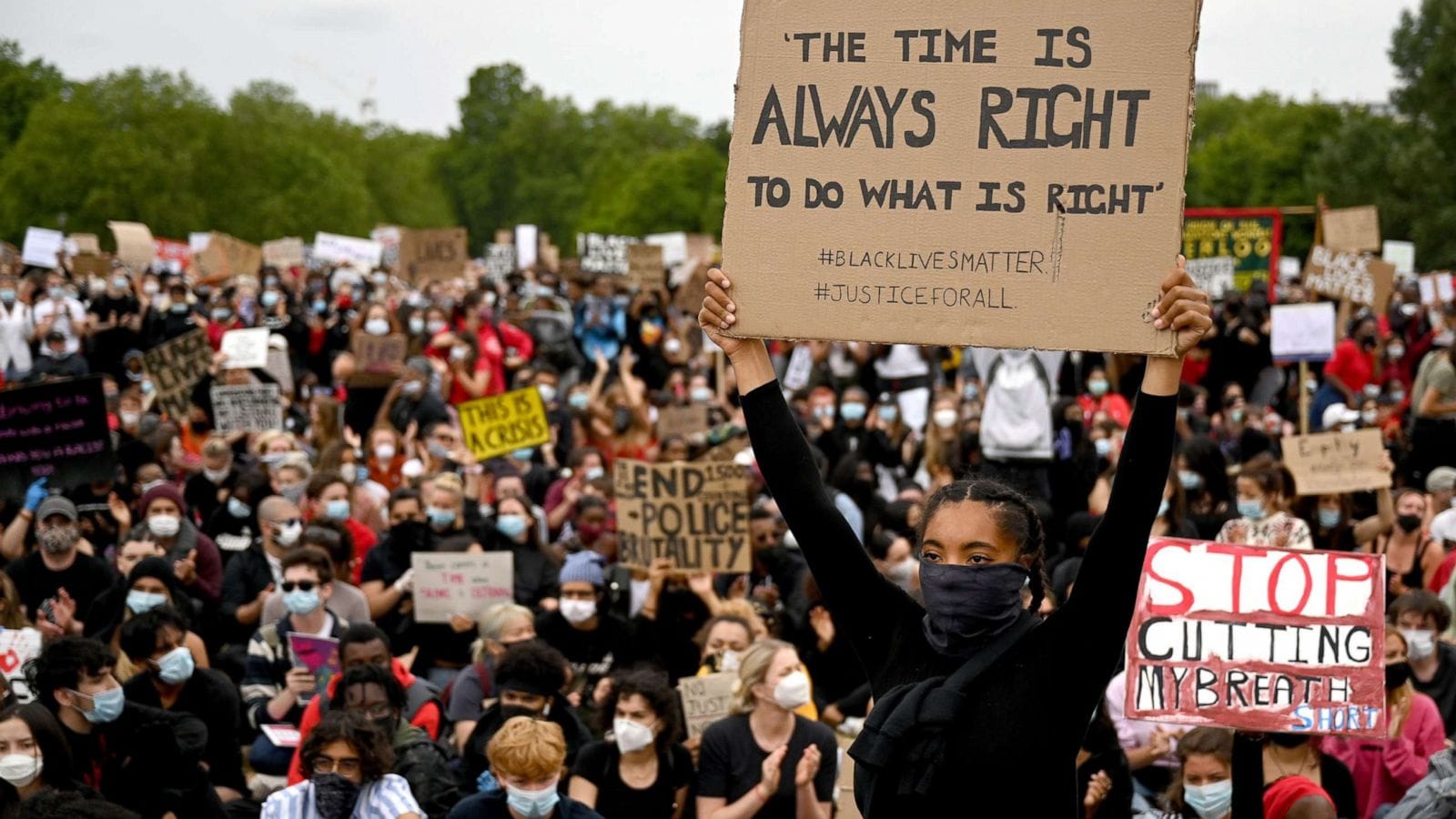
As of last night, at midnight (EST), ~50,000 dockworkers, as part of the International Longshoremen's Association (ILA), walked off the job in a strike that will shut down ports across the whole east coast and the gulf. While you may not have heard, as this has been buried beneath other equally massive stories, largest of which are the expanding genocide, the terrible disaster post Helene, and the neverending election spectacle, it merits some sustained attention.
This is one of the largest port shutdowns in our lifetimes, and, combined with the destruction of the Francis Scott Key bridge shutting down of the port of Baltimore, and the Houthi attacks in the Red Sea forcing global shipping reroutes, it has been a bad year for the international shipping industry. The strike, at least, was expected by the industry, seeing as they knew that they weren't gonna budge on their incredibly bullshit contracts, so they've already been preparing for what might otherwise be a disastrous holiday season by stocking up early and often. Still, expect them to blame workers for every change in pricing, availability, or delivery speed for as long as they're on strike: the media has already begun doing this propaganda for the bosses.
(This is precisely what the laws around strikes, union legalization and potential executive intervention [Taft-Hartley] are designed to do, to minimize potential economic harm by strikes and to make it illegal for multiple industries to go out in sympathy with one another. The result is that legal strikes more and more resemble employer driven lock-outs, which is when the employer knowingly shuts down the shop in order to end a struggle by winning concessions from the now wageless workers. Part of what was so powerful about the WGA/SAG-AFTRA strike was how long they held out, which turned the tables and put real economic pressure on the studios, although it was incredibly difficult on workers).
October 1st was also called as a international General Strike for Palestine, a call to all workers around the world to walk out, refuse work, and not spend any money or make any money for the bosses until the genocide is stopped.
These are the conditions of the current moment, today, and I want to indulge in a little bit of creative fabulation, not because I think what I'm about to describe is going to happen, but because it is possible, and building new modes of revolutionary action that cross seemingly disparate struggles is going to require all of us to engage in creative and inventive thinking based in current possibilities.
The pieces are in place for an anti-capitalist revolution of the international working class to decisively begin today, October 1st, 2024.
Ok, if you haven't rolled your eyes so hard you passed out or immediately closed the tab: I know how absurd that sounds. If anything feels far away at this moment, its the revolution. The genocide in Palestine and Sudan, flooding in the Appalachians and the Himalayas, wildfires in Argentina and Bolivia, and terrifying record sea temperatures, to say nothing of the far right claiming victory in Austria, and a US election that features an openly Nazi candidate promising Kristallnacht and mass deportation.
But I think there is a clear series of steps that, again, could be taken today, that would initiate a revolutionary sequence.
It begins with the port workers on strike. All the ports in the East Coast and the Gulf are shut down, and the ILA successfully pickets, all the workers coming in and more or less taking de facto control, though cops, private security and managers stay around the perimeter and in some of the offices, and move in and out with some ease. Then a call goes out, maybe from the ILA workers, maybe from the folks engaging in the General Strike for Palestine, but people from all across the East Coast and the Gulf who have gone on strike start heading for the ports in their home cities in solidarity.
When they arrive at the ports, the crowds, joining with the dockworkers, outnumber the police security and scabs dramatically, and they push them out of the docks entirely. The crowd celebrates, but then wonders what to do next. At one port, let's say at Savanna, GA, which has just missed the brunt of Helene, a worker's council gets an idea.
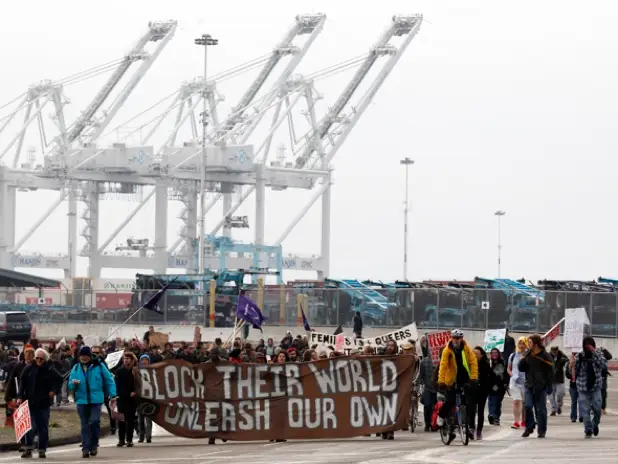
They look through shipping manifests and locate containers holding water, food, cleaning and medical supplies, and begin loading them onto trucks. The reactivation of the cranes and trucks leads to some frantic phone calls by the managers, but corporate HQ is monitoring on their surveillance feeds and it doesn't look like anything is being destroyed or disorganized, so they don't feel the need to escalate. Nevertheless, the police press briefly into the gates, which leads to the crowds barricading the port and further entrenching their control.
A convoy of these trucks, some with armed escorts, then leave the port, but the cops and bosses don't understand what's going on, and think that maybe for some reason they're just shipping stuff out, and so they fail to decisively intervene. Word quickly spreads to the other ports: workers are taking food, water and medical containers and prepping them for delivery to regions devastated by the hurricane. Savanna's proximity to badly damaged rural GA areas means that within hours the convoy began arriving, and images of people in Keffiyehs unloading containers full of supplies to hurricane victims begin circulating on social media.
The governor of Georgia and the President immediately begin giving statements to the media denouncing these actions, which the media gleefully pick up. This is looting, after all, it's criminal! However, the fact that the workers are giving these supplies to disaster survivors tempers how far the White House is willing to go in public. And it's an election year, they have to handle this carefully!
Instead, the president gets on the phone through a backchannel to the leader of the ILA, and as the day ends the union sends out a (West-Wing penned) memo to its organizers at every port denouncing the "madness" in Savannah and calling on workers to stop fraternizing with the solidarity protestors.
This works in some places, and at the Port of Miami physical fights break out as ILA workers push these weird solidarity folks out of the port entirely. But in other ports it just leads workers and crowds looking up what happened in Savannah, who then stay late at the ports, and begin doing it themselves.
Meanwhile, police and state troopers are being deployed to the highways. Things seem to quiet down, but the next day, early in the morning, at the exit of the Port of Providence a gun battle briefly breaks out between cops and workers, with the workers unable to break through and get their convoy on the road. Other ports, however, are having more luck. Police attempt to pull over the 18 wheelers, but when truckers refuse to budge, it ends up appearing like they're receiving an escort, and has the effect of speeding them to their destination.
At one point, a truck full of diapers, the image of a baby emblazoned on the side of the container, is stopped by a state trooper barricade, and pictures of police pointing assault rifles at the young driver standing in front of an infant's smiling face become an instant meme. As the staties figure out the likely travel paths, they begin building checkpoints and roadblocks across the main interstates. A big convoy from the Port of New York and New Jersey is stopped this way, and told to return the containers. When strikers refuse, they are arrested, and scabs brought in to drive the truck back to the port.
Communicating on CB radio networks and Signal chats, however, drivers elsewhere manage to figure out and map out roadblocks and discuss open routes, routes that end up going through towns, suburbs and rural villages where trucks usually don't pass. More and more people spill out of their workplaces into the street, to watch, cheer, and occasionally fight for these caravans.
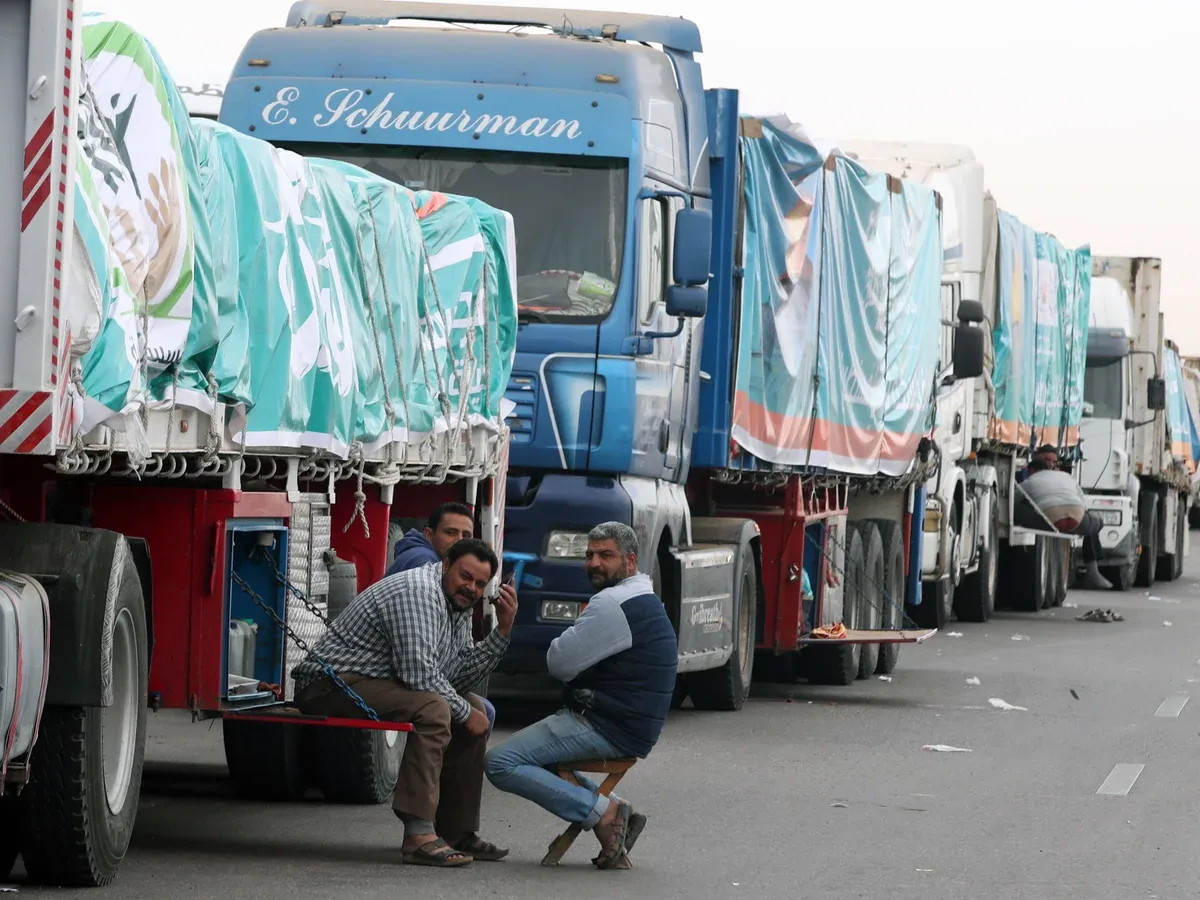
At the end of the second day, a strike that was countable at maybe a hundred and fifty thousand people countrywide has generalized wildly. Videos of relief convoys arriving in the mountains of Tennessee and North Carolina being welcomed by cheering, weeping crowds go viral. One video shows police in Asheville beating relief workers as they try to accept jugs of water from a truck bed: similar scenes occur everywhere the convoys arrive, which leads to relief workers fighting the police, and building barricades made of downed trees and flood detritus. Soon, the police have been pushed out of most of the areas where hurricane mutual aid is taking place.
The president is now in a politically impossible situation. While denouncing the criminal actions of the convoys, he can't deny their popularity, or how good the press they're getting looks, despite the best efforts of the papers of record to smear these mutual aid pirates. The candidate for the other party is calling for mobs of white patriots to come out and shoot up the convoys, while also claiming that they stole his idea to distribute free goods to the people.
The workers release a statement: we will stop taking containers from the Port if you cease supplying arms to Israel and meet the demands of the ILA. Some factions are claiming they will even stop striking and go back to work, while others are furious and saying they won't stop any of their actions, but in any case, the president has an out. And an aide suggests that the money put aside for Israel could be diverted to refund insurance companies suddenly on the hook for damages in lost and stolen commercial property in the upheaval, which might reach into the billions...
The fact that I can tell this story obviously does not make it reasonable. I do not believe this will actually happen right now. But the value of thinking through an entire scenario like this is that it gives us some obvious points of failure, points where we could intervene, organize and build power so that the next time a moment like this arises, where different forces and different struggles are in overlapping motion, where different opportunities present themselves, we might be able to move closer to them, might have space for different forms of improvisation, solidarity and action to take place.
So, some of the most obvious failure points that I see in this scenario.
- The Strike for Palestine was not large enough- This is simultaneously the most obvious problem and the hardest one for us to solve– the question of numbers. How do we mobilize enough people to make this feasible? We still don't have a good answer for this question, but it's where we always get bogged down. When we don't imagine scenarios beyond "everybody goes on General Strike!" then all we think about is how to get to that point. But what do we do once we are on strike? The idea of the strike and the movement is already so fantastical that we don't dare ask ourselves. But then, when mass mobilizations do arise, our ideas of what is possible or desirable remain meager. "I guess we stay in a big crowd?" The constant marching in circles that deescalated the George Floyd Rebellion after the first two weeks demonstrated that the organizers and the left had literally no ideas of targets or possibilities once the crowds were large, and so the initiative collapsed as the movement massified.
- Solidarity between port workers and regular folks leading to co-mobilization- This is another sticky one, but one that is much more solvable. Indeed, in recent movement memory, during the Occupy Oakland port shutdown on December 12, 2011, ILWU workers and radical social movement protestors joined together to shut down four ports, two of which were among the world's largest deep water ports. However, this kind of solidarity can be hard to build (see: May '68, the Italian student movement, etc). The thing to emphasize, however, is that it will almost certainly not come from the top down in the unions. Not only are the unions themselves mostly conservative organs, they are so legally constricted that even making plans like this are complicated. It's super cool that Shawn Fain, president of the UAW, has devised a plan to set up a potential general strike for 2028, but that will rely on years of significant and serious inter-union planning and is not flexible enough to take advantage of a situation that arises organically from the struggle. So it is going to take rank and file workers and regular activists and organizers building relationships outside of the union structures for this kind of solidarity to grow to the point of movement utility.
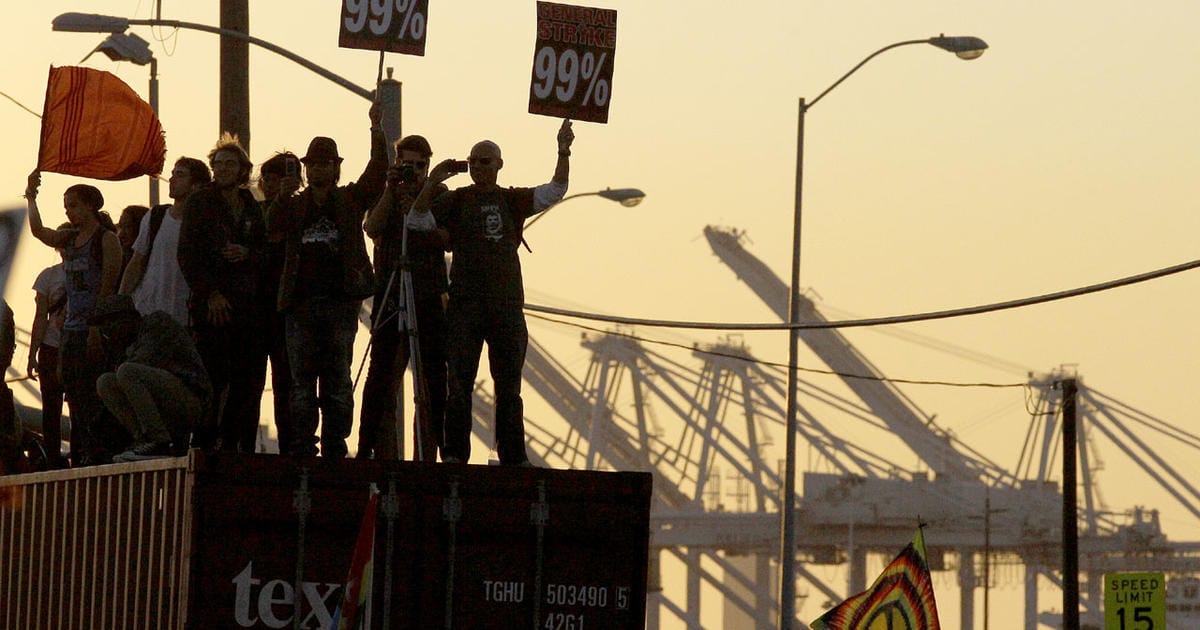
- Truck Drivers helping a left movement? The owner-operator model of large-haul and long distance trucking means that many truckers have historically been a relatively conservative bloc, seeing as they were actually small business men rather than workers. And they were men, as the industry is one, alongside e.g construction and fishing, that has been successfully kept under strict gender control. Combine that with trucking's association with regressive climate politics, and a long history of cultural capture by the right, and when we think trucker convoy we think fascist anti-public health protest not mutual aid. But this has been shifting steadily over time. If you look at the actual breakdown of said Canadian truck convoy, it was overhwelmingly owners who took part, many of them folks who owned multiple rigs and rarely even drove themselves any more. Like every other industry, truck driving has been casualized, precaricized, and the middle class hollowed out. Recent years have seen aggressive boom and bust cycles in long distance trucking, which has further shaken the hold of owner operators and lead to more and more hourly/waged workers doing trucking. There is space here, too, to begin imagining ways to intervene, organize, or at least build relationships and solidarity with local truckers.
- Willingness to take the containers - This one is where the nature of the opportunity provided by the current movement matters. It is unlikely that striking longshoremen would just up and begin looting their docks without cause. But there is a long history of both labor and social struggle involving this kind of looting, from the railroad strikers of 1877' Great Upheaval who looted train cars and then used them as flaming barricades to block the railways, to protestors rising up for Keith Lamont Scott, executed by police in Charlotte, NC in 2016 (centrally located to where this story takes place), who looted and then overturned and set alight container trucks on the local interstate. An integration of our movements, standing in solidarity with strikers and working to provide mutual aid, makes this kind of logical leap much more possible.
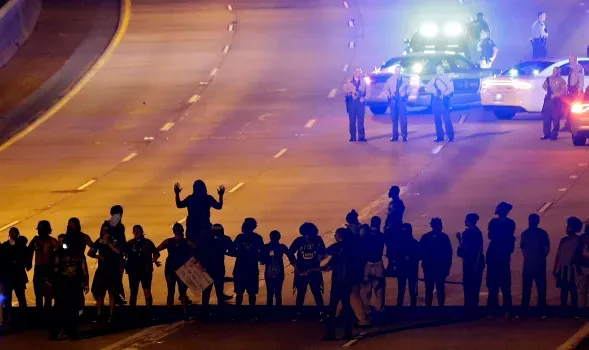
- Fighting the police/armed escorts- Honestly, this one we've actually got some experience with at this point. There are a number of anti-fascist organizers, left-wing gun folks, and others ready to take up this call. Much like the question of numbers, the question of arming ourselves and defeating the cops is one we've spent a lot of energy on, and if it's something you're interested in, odds are there's a crew somewhere near you you can connect with.
There are lots of other places in the story where we'd face problems, where I can imagine things falling apart. And there are probably many where I can't recognize a failure or a weakness, but you do. That's great, because the point of this exercise isn't to game out this particular scenario, which will not in fact happen again, but to figure out which questions we need to answer, where our energies need to go, in order to build real power and produce real opportunities and openings for attack, escalation, and initiative.
Can you imagine a massive spiraling upheaval opening up at this moment? Do you keep your eyes open to possible scenarios like this? How do you think something like this could play out in your community? These are questions which, when asked with proper rigor, provide us with real visions about how to move forward, wherever we are, however we prefer to move. We have seen, over the last fifteen years, how many people are willing to fight. If we can join that willingness with a vision of worthwhile targets, actions and tactics, we will be able to take the next step toward liberating this world.
